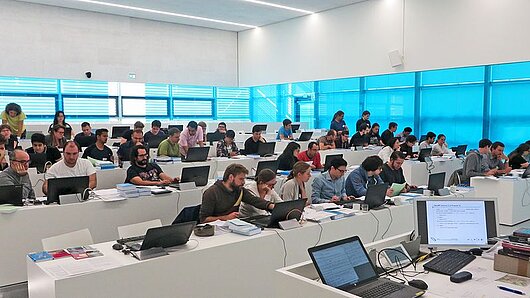Höchstleistungsrechenzentrum Stuttgart

15. Juli 2024
09:00
19. Juli 2024
17:00
Englisch
Fortgeschritten
ThemenbereichePerformance-Optimierung & Debugging
ThemenCode-Optimierung
MPI
MPI+OpenMP
OpenMP
In order to attend the workshop, you should already have an account on Hawk and your application should already be running on the system. Furthermore, we require that you bring your own code including a test case which is set up according to the following rules:
use case selection:
When processing the test case, your code should have a behavior and profile which is as close as possible to that of current and future production runs.
If possible, the test case should be representative for those production runs of your group which consume the largest part of your compute time budget.
number of cores:
In order to be representative, the test case should be in size comparable to the respective current and future production runs.
In order to save valuable resources and to allow for a productive workflow, it should, however, be as small as possible.
So please be prepared to reduce the size of your test case during the workshop! This can often be achieved by reducing the simulated domain or resolution and keep the computational load per core constant ("weak down scaling").
wall time:
In order to allow for a productive workflow, the wall time should be a few minutes only.
At the same time, it should cover all important parts of the code, i.e. computation, communication and I/O.
So take into account to reduce the number of simulated time steps and increase I/O frequency to render investigation of I/O possible within such a low number of timesteps.
If you are unsure about how to set up your test case, please contact Björn Dick (contact data can be found below).
In general the language of instruction is German, but can be changed to English, if required.
HLRS, HPE and AMD user support staff
Local times: Central European Time Zone (Berlin).
Communication format: Face-to-face, via Slack, Zoom and Email.
We start ON_SITE/ONLINE workshop on Monday with
Workshop ends on Friday, latest at 17:00.
Daily agenda:
Workshop talks:
Handouts will be available to participants in terms of PDFs.
This course will be hybrid, i.e. it will take place at HLRS on-site, but it will also be possible to attend remotely. Participants, remote as well as on-site, have to be aware and agree that they might appear in the live video stream taken by a camera in the back of the lecture room or by a webcam on laptops. The live stream will not be saved. We strongly recommend to attend this course on-site since on-site attendance is much more effective and efficient in our experience. Therefore we might give priority to on-site over remote participants during registration.
Course is fully booked.
Members of German universities and public research institutes: none
Members of universities and public research institutes within EU or PRACE member countries: none
Members of other universities and public research institutes: 120 EUR
Others: 400 EUR
Björn Dick phone 0711 - 685 87189, bjoern.dick(at)hlrs.de
Khatuna Kakhiani phone 0711 685 65796, khatuna.kakhiani(at)hlrs.de
HLRS is part of the Gauss Centre for Supercomputing (GCS), together with JSC in Jülich and LRZ in Garching near Munich. EuroCC@GCS is the German National Competence Centre (NCC) for High-Performance Computing. HLRS is also a member of the Baden-Württemberg initiative bwHPC. Since 2025, HLRS coordinates HammerHAI.
See the training overview and the Supercomputing Academy pages.
März 02 - 06, 2026
Dresden
Englisch
März 23 - Apr. 17, 2026
Hybrid, Stuttgart
Englisch
März 23 - 27, 2026
Hybrid, Stuttgart
Englisch
Apr. 21 - 24, 2026
Online
Englisch
Juni 01 - 02, 2026
Online
Englisch
Okt. 19 - 23, 2026
Stuttgart
Englisch
Okt. 19 - 23, 2026
Stuttgart
Englisch
Okt. 27 - 28, 2026
Online
Englisch